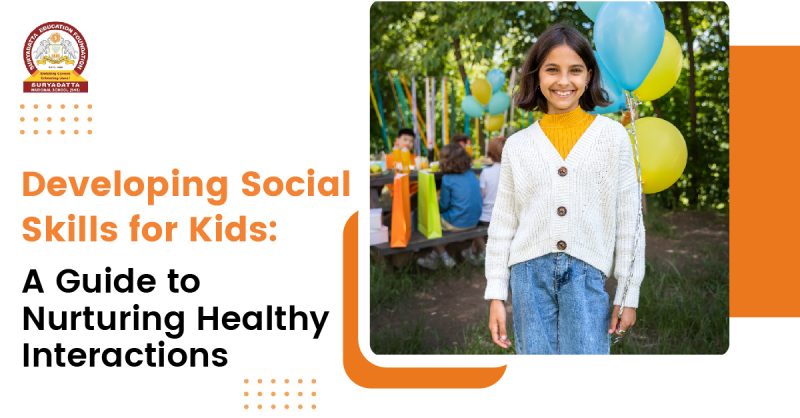In the journey of childhood development, social skills play a vital role in shaping children’s overall well-being and success. Strong social skills empower children with the ability to build meaningful relationships, communicate effectively, demonstrate empathy, and develop self-confidence.
This blog aims to shed light on the importance of social skills and how nurturing they can positively impact children’s lives.
Understanding Social Skills:
Social skills are the foundation of healthy social interactions. They encompass a range of abilities, including communication, active listening, empathy, cooperation, and problem-solving. By honing these skills, children can navigate social situations with ease, forge meaningful connections, and thrive in diverse social settings.
Benefits of Developing Social Skills:
Nurturing social skills provides numerous benefits for children. Strong social aptitude enables them to form better friendships, succeed academically, display emotional intelligence, and exhibit overall social competence. These skills empower children to interact with others confidently and respectfully, fostering positive and supportive relationships.
List of Social Skills for Kids:
A comprehensive list of social skills includes active listening, effective communication, empathy and perspective-taking, cooperation and teamwork, sharing and taking turns, following instructions, respecting boundaries, displaying good manners, conflict resolution, building friendships, showing kindness, recognizing diversity, understanding emotions, and being gracious in winning or losing.
Age-Appropriate Social Skills:
Social skills development varies with age, and understanding age-appropriate skills is crucial for effective growth. Preschoolers benefit from learning to share and take turns, while elementary school children can focus on conflict resolution. Adolescents benefit from developing effective communication and empathy.
Effective Communication Skills:
Effective communication forms the backbone of successful social interactions. Parents can teach their children to express themselves clearly, actively listen, maintain eye contact, and respect others’ opinions to foster positive communication.
Developing Empathy and Perspective-Taking:
Empathy is an essential skill for understanding others’ feelings and perspectives. Activities and exercises can be employed to help children develop empathy, promoting kindness and compassion.
Cooperation and Teamwork:
Cooperation and teamwork are vital for social harmony. Parents can encourage children to engage in cooperative activities and games that promote collaboration and teamwork.
Problem-Solving and Conflict Resolution:
Teaching children problem-solving and conflict resolution techniques equips them with valuable life skills. Strategies for handling conflicts, negotiating, finding solutions, and compromising are essential for harmonious relationships.
Teaching Social Skills at Home:
Parents can actively reinforce social skill development at home through modeling positive behaviors, providing positive reinforcement, setting clear expectations, and creating a nurturing environment.
Social Skills in School and Community Settings:
Schools and community organizations play a pivotal role in fostering social skill development. Inclusive classrooms, social skills training programs, and extracurricular activities contribute to a child’s social growth.
Encouraging Social Interaction and Building Friendships:
Promoting social interaction and friendship-building opportunities helps children develop strong social bonds. Playdates, group activities, and encouraging children to step out of their comfort zones can facilitate healthy interactions.
Supporting Children with Social Difficulties:
Some children may face challenges in developing social skills. Parents and caregivers can offer support and seek professional help if needed, creating a supportive environment for growth.
In the journey of childhood development, social skills stand as pillars of healthy and fulfilling interactions, shaping children’s lives profoundly. As parents and educators, we recognize the paramount importance of fostering strong social skills in children.
At Suryadatta National School (SNS), our commitment to nurturing all-rounders goes beyond academic excellence. We firmly believe that social skills are fundamental to creating confident, empathetic, and socially competent individuals.
By integrating the principles of effective communication, empathy, cooperation, and problem-solving, SNS instills in its students the ability to navigate the complexities of social settings with ease and grace. Our holistic approach to education empowers children to build meaningful relationships, display kindness, respect diversity, and handle conflicts with maturity.
As parents and educators, let us continue to emphasize the significance of social skill development in children’s lives.
At Suryadatta National School, we strive to equip our students with a well-rounded skill set, ensuring they not only excel academically but also flourish in their social interactions.
Together, let us cultivate a generation of all-rounders who embrace the world with open hearts and open minds.

